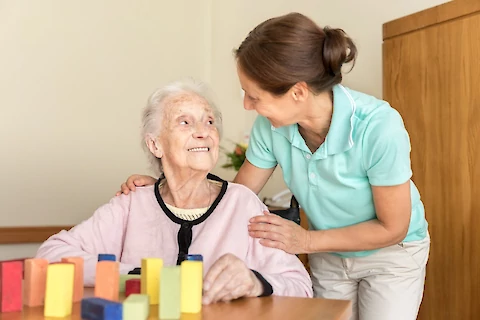
Navigating The Stages of Dementia with Knowledgeable In-Home Care for Your Loved Ones
Navigating healthcare when it comes to our parents and our aging loved ones can be emotionally difficult and confusing to implement. Babies don't come with a manual and neither do our parents. When we first hear the diagnosis of dementia, it can be scary. It's a new experience for just about everyone.
Our parents are going to need some help. Dementia is a general term referring to memory loss and cognitive impairments that interfere with their ability to live their lives and act independently. Even when the disease is caught early, your loved one is going to need your help. Their safety, security, and happiness are of the utmost importance.
How Do We Determine When Our Parent(s) Need Extra Help?
It's important to observe everything, but not in a way that takes away from their dignity. And it's important to really pay attention to everything. And we mean everything:
- The words they choose. Do they sound the same?
- The tone of their voice. Do they make a statement sound like a question?
- The order of the home. Is it normal for them?
- The way that they move. Has their gait changed?
- How often do they forget their purpose? For example, going into the kitchen and forgetting why they went in there.
- Do they seem unusually aggravated or upset?
Pre-dementia constitutes the first symptoms of decline. Many times, these stages are only recognized in hindsight because the symptoms can easily be written off by stress, another disease, or simply signs of natural aging. It's too early to be tested for dementia at this time. Your observations can really help your loved one.
When they start to lose important things easily, forget once-known names, and start to get lost, it's time to see the doctor and start discussing your options for help. The symptoms will continue to get worse and in-home care services can help guide you through what you are all experiencing while helping your loved one continue to live independently and in their own home.
Worsening Dementia Symptoms
When a person's dementia begins to reach a serious level, it's necessary to take them to the doctor. They may need someone with them at every appointment from now on, to remember what the doctor's say about how to give your loved one the best care.
Mild Dementia
A person with mild dementia may seem confused about the things that are currently going on in their lives. They may avoid social gatherings and start forgetting things from their past. They may have difficulties with paying bills and managing money. They are cognitively aware of their decline, even though it is confusing, but may try to hide their symptoms.
Moderate Dementia
Symptoms are evident and can't be hidden. Your loved one will need help every day to organize medications, calm disorientation, and complete certain daily functions, such as medication reminders and help with doctor's appointments. It's important at this time for them to have someone grounded to act as a support. They can forget their address or become confused on the date. Making decisions becomes extremely difficult.
Moderate-Severe Dementia
When a person reaches the moderate-severe level, they may suffer from delusions, remember the past incorrectly, and become extremely anxious and irritable. Your loved one probably won't remember recent events and even forget the names of friends and family. They may be stuck in almost constant confusion, and they will need help 24 hours a day, 7 days a week. Cooking, going for a walk, or taking medications on their own can become dangerous.
Severe Dementia
In the final stage of dementia, your loved one can lose the ability to speak, to physically take care of themselves, and to walk. These changes are progressive, and they will begin to need help with the more intimate activities, such as using the bathroom.
In-Home Care Can Help
When you were a baby, you were your parent's world. Sure, they had jobs, but you were their world. You are in a different situation. You still have your family, your job, and your responsibilities to maintain while caring for your aging parents. They may have cared for you alone, but you don't have to do the same. You have to take care of yourself before you can take care of anyone else.
In-home senior care can relieve your stress and give you time for all of your responsibilities, including caring for your loved one. Trained compassionate senior helpers can ease our loved one's transition through the next chapters of their lives.
Senior Helpers in Overland Park has an amazing team of in-home caregivers to help you and your loved one at every stage of dementia. Contact us online or at 913-851-4800 to schedule a LIFE Profile Assessment to determine your needs and discuss care. Allow us to guide you on your journey.